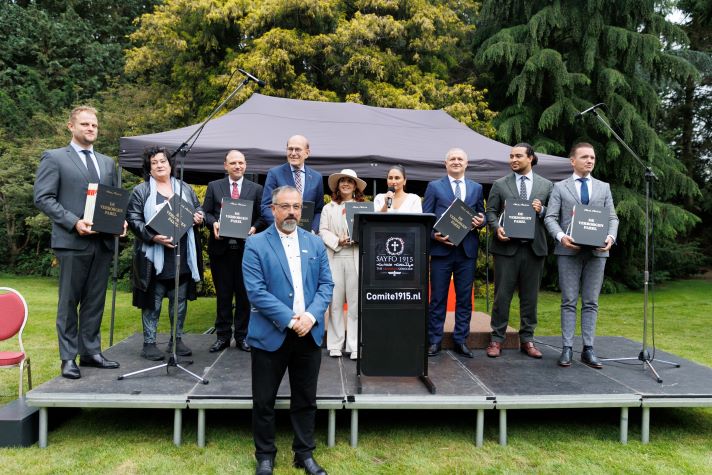Europe’s Divided Memory: Triumph in Södertälje, Setback in Enschede
SÖDERTÄLJE, Sweden / ENSCHEDE, The Netherlands — On a balmy summer evening last June, the Södertälje municipal council voted unanimously to erect Sweden’s first national monument to the 1915 Sayfo Genocide, a long-awaited tribute to the more than two million Syriacs (Arameans–Assyrians–Chaldeans), Armenians, and Greeks massacred by Ottoman Empire and its Kurdish tribal allies beginning in 1915. The resolution, funded entirely by the municipality and embraced by every political faction — save one, signaled that at last, the silence enshrouding generations of grief had begun to crack.
Scheduled for unveiling on 24 April 2026, the Södertälje monument will stand in a public square, its central cross a solemn affirmation of faith, memory and resilience. “This is more than stone and metal,” said Elias Hanna, a community organizer and grandson of Sayfo survivors. “It’s the embodiment of our story, finally written in the heart of a nation that welcomes us.”
For decades, survivors and their descendants carried their history across borders, inscribing it in language, prayer, and poetry when no official archive would. In Södertälje, where some 40 percent of residents trace their roots to Sayfo survivors, that history resonates in every conversation. The monument’s passage is not merely municipal business, it is a moral reckoning, a national commitment that justice delayed must not become justice denied.
A few weeks earlier, in Enschede, the Netherlands, the Syriac (Aramean–Assyrian–Chaldean) community encountered a far less hopeful outcome. For nearly three years, local activists had petitioned the municipality to install a Sayfo commemorative monument in the city’s centrally located Volkspark, the site of their annual 15 June remembrance. In 2022, the Stichting Comité Sayfo 1915 received an encouraging nod from the mayor — so long as broad support could be secured among Enschede’s myriad Syriac (Aramean–Assyrian–Chaldean) civil and religious organizations.
But after protracted negotiations over design, inscription and symbolism — and amid reported pressure from local Turkish groups and diplomatic objections from Ankara — the mayor withdrew his commitment, citing a lack of consensus. When the Comité took the city to court, it lost, and was ordered to cover the municipality’s legal costs.
“It feels like déjà vu — injustice repeated,” said Lina Youkhana, a member of the Comité Sayfo 1915. “We did everything we could to unite our community around this monument. Yet politics and fear prevailed.” Enschede’s 13,000-strong Syriac (Aramean–Assyrian–Chaldean) diaspora now faces the prospect of restarting talks from scratch, uncertain how long the process may take or whether it will ever bear fruit.
Call for Patience and Persistence
The contrasting fortunes of Södertälje and Enschede underscore both the hard-won progress and the persistent obstacles facing the Syriac (Aramean–Assyrian–Chaldean) people in their quest for recognition. In Sweden, decades of grassroots advocacy and municipal partnership culminated in a unanimous vote and a clear timeline. In the Netherlands, a similar campaign has been stymied by political hesitancy and external interference.

Yet the right to memory is not a fleeting privilege — it is a fundamental claim of justice. The deliberations in Enschede deserve the same thoroughness and respect that Sweden extended: genuine community dialogue, transparent decision-making, and, above all, the patience to let the voices of survivors and descendants be heard without fear or favor.
“We owe it to those who perished, and to those who survive, to see this through,” Ms. Youkhana insists. “As Sweden showed us, this process may take years. But every moment spent in honest negotiation is a moment spent honoring the dead and empowering the living.”
In April 2026, when Södertälje unveils its Sayfo monument, European memory will have gained a new landmark — but also a renewed responsibility. For Enschede and cities across the continent, the message is clear: carving truth into stone demands time, integrity and unwavering solidarity with the silenced. Only then can monuments cease to be symbols of contested politics and become enduring tributes to human dignity.





















